

Social media in court: your tweets could be used as evidence against you. As we increasingly use social media platforms such as Facebook, Twitter, Instagram and WhatsApp to communicate with each other, many of us are unaware of the ways in which our posts might later resurface – and get us into trouble with the law.
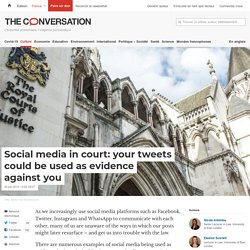
There are numerous examples of social media being used as evidence in the criminal justice system, leading to convictions and sometimes prison sentences. Peter Nunn from Bristol, England, was imprisoned in 2014 after MP Stella Creasy and feminist Caroline Criado-Perez were subjected to a string of abuse on Twitter. And after the London riots of 2011, two men were imprisoned for incitement after posting messages on Facebook inviting those who read them to meet the next day and wreak havoc in their local town.
Police were able to trace the messages back to the defendants, leading to successful prosecutions. The Impact of Social Media on Trials. In this day and age, social media has found its way into all areas of our life with Australians now spending on average 100 minutes per day on social media.
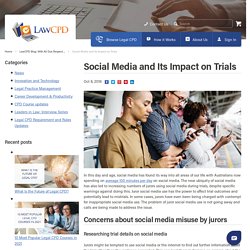
The near ubiquity of social media has also led to increasing numbers of jurors using social media during trials, despite specific warnings against doing this. Juror social media use has the power to affect trial outcomes and potentially lead to mistrials. Associate Professor Jane Johnston - UQ Researchers. Where public interest, virtue ethics and pragmatic sociology meet: modelling a socially progressive approach for communication Johnston, Jane (2020).

Where public interest, virtue ethics and pragmatic sociology meet: modelling a socially progressive approach for communication. Westminster Papers in Communication and Culture, 15 (2), 79-94. doi: 10.16997/wpcc.355 Three phases of courts' publicity: reconfiguring Bentham's open justice in the twenty-first century Johnston, Jane (2018). Three phases of courts' publicity: reconfiguring Bentham's open justice in the twenty-first century. Juries and social media final. Social Media and the Fair Trial – Nest. The widespread use of social media is having an impact on the legal process.
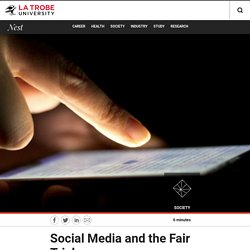
More specifically, everyday use of channels like Twitter and Facebook are presenting challenges to the ideal of the fair trial, with some jury members using the channels to do more than simply announce (or complain) that they’ve been picked to do jury duty. But what’s the problem with jury members using social media during a case? What impact can a few stray tweets have on our justice system? The report, Juries and Social Media, summarises the fundamental principles at stake: Traditionally, courts have sought to balance a number of potentially conflicting rights and principles when governing trials.
Juries and social media final. Jury duty explained: From allowances to exemptions, here's what you need to know - ABC Everyday. If you're an Australian citizen and you're enrolled to vote, there's a good chance that one day you'll open your mailbox to find a fancy letter requiring you to attend your local court for jury duty.
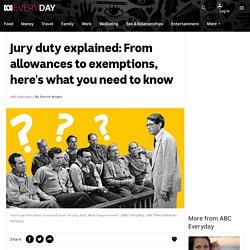
If you haven't the faintest clue how the legal system works and your courtroom knowledge is limited to the storylines of TV legal dramas, you'll likely have a lot of questions. For starters, what exactly does a juror do? If you've got to work, can you skip jury duty? Jury duty explained: From allowances to exemptions, here's what you need to know - ABC Everyday. Jury Service NSW - Welcome to jury service. What happens in a trial In a criminal trial the Director of Public Prosecutions prosecutes a person accused of having committed a crime.
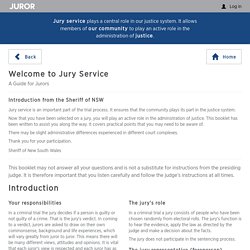
The person concerned is referred to as the accused. You will be asked to decide whether the accused is guilty or not guilty. Issues related to jury deliberations - Steering Committee on Justice Efficiencies and Access to the Justice System. Media, Persuasion and Propaganda by Marshall Soules. DonatePremiumSign in EnglishEspañolРусскийTürkçe Faster previews.
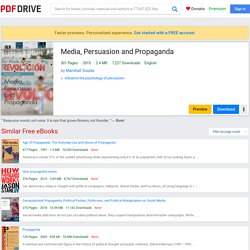
Personalized experience. Get started with a FREE account. Completed Law Reform Projects - Tasmania Law Reform Institute. Inside The Jury Room - Law Report - ABC Radio National. Trial by jury is central to our criminal justice system.
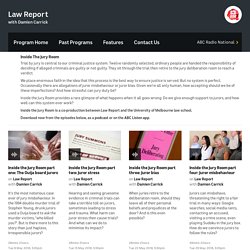
Twelve randomly selected, ordinary people are handed the responsibility of deciding if alleged criminals are guilty or not guilty. They sit through the trial then retire to the jury deliberation room to reach a verdict. Inside the Jury Room part three: Juror bias - Law Report - ABC Radio National. Damien Carrick: Hello, Damien Carrick with you, welcome to the Law Report and episode three of 'Inside the Jury Room'.
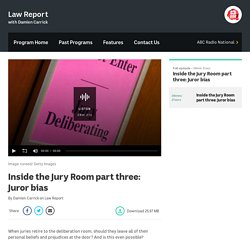
And just a warning, there's some language in this episode that might offend. Jeremy Gans: Do you stop every trial where the jury does something a little odd? What's the line you draw? Trial by podcast - Media Watch - Media Watch - Media Watch. SAMANTHA ARMYTAGE: … right before our eyes, exclusive pictures here of Chris Dawson heading for Sydney to face charges over the disappearance of his wife nearly four decades ago.
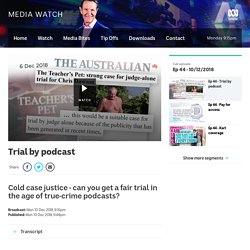
Now, it's the cold case that has gripped the nation and the world.NATALIE BARR: There he is in the back row of that plane, on his way to Sydney. We have all the new developments this morning.- Sunrise, Channel Seven, 6 December, 2018 Hello, I’m Paul Barry, welcome to Media Watch. And as you’ve no doubt heard there’s been a breakthrough in Australia’s most popular cold case. Almost four decades after Sydney mother of two, Lyn Dawson, was last seen alive, her husband has been charged with her murder and the media has dogged him every step of the way: How the Casey Anthony Murder Case Became the Social-Media Trial of the Cent...: EBSCOhost. Result List: trials and media: EBSCOhost. Is Jury Sequestration Actually Effective? Jury sequestration is the isolation of a jury to avoid accidental or deliberate tainting of the jury by exposing them to outside influence or information that is not admissible in court and can be a “hot” topic for criminal defense lawyers.
On one hand, trying to control the information jury members see and hear outside of court can be a bit like herding cats. On the other hand, a defendant’s “jury of their peers” is often composed of lay people of nearly all walks of life, who are all equally subjected to news and media. Exposure of jury members to media coverage about high-profile cases can present a myriad of legal issues.
There have been many high-profile criminal cases over the years where juries were sequestered, such as Bill Cosby’s sexual assault trial, and the murder trials of Casey Anthony and George Zimmerman. The O.J. What Is Juror Bias and How Can It Be Prevented? According to the Australian legal system, if you are on trial for a crime, you will either be tried by a judge alone or by a judge and jury.
Many people believe that having a jury trial helps guarantee the fairest outcome, because instead of the decision resting on a single person, the outcome of the trial is decided by twelve people from different backgrounds. Unfortunately when it comes to jury trials, there is no way of knowing exactly what each individual member’s personal beliefs and opinions might be.
Juror bias can be a problem especially in high profile cases which have received a large amount of media attention. If jurors have already read about the case and formed their own opinions either for or against the defendant, it may be difficult for them to put these aside and make a decision based only on the evidence presented at the trial. The Impact of Social Media on a Fair Trial. Social media can be a source of information and leisure, a way to connect with other people and a means to express views about a range of subjects – including those which invoke emotions such as anger and disgust. But legal experts are warning social media users to be careful about what they post online, especially when relates to pending criminal investigations and prosecutions, as uninformed and unfairly prejudicial posts and remarks can adversely affect a defendant’s right to a fair and impartial trial. Emotive topics. Completed Law Reform Projects - Tasmania Law Reform Institute.
Wheres the Representation?: The Impact of White Washing on Black.
A Brief History of Whitewashing in Film - One Room With A View. Word is out that Netflix’s Marvel universe has finally dropped the ball with Iron Fist, a lacklustre attempt to raise a middling character from obscurity. Likewise, if our word is anything to go by – and, trust us, it is – then Ghost in the Shell is (perhaps inevitably) lightweight and forgettable. More important than the critical reception of these two properties, however – and there may be space to read the indifference towards them as more than just coincidence, but as a “last straw” from critics fed up with cultural appropriation and a failure of representation that continues to occur in mainstream media – is the controversy that continues to orbit key casting decisions made in each. Is Hollywood to blame for all this? Of course not; but it does hold a mirror to a world that privileges some and fails to acknowledge others. Is it ScarJo’s fault that she was cast in the lead as Major Motoko Kusanagi?
Dissociative Amnesia - Psychiatric Disorders - MSD Manual Professional Edition. The main symptom of dissociative amnesia is memory loss that is inconsistent with normal forgetfulness. The amnesia may be Rarely, dissociative amnesia is accompanied by purposeful travel or bewildered wandering, called fugue (from the Latin word fugere "to flee"). Localized amnesia involves being unable to recall a specific event or events or a specific period of time; these gaps in memory are usually related to trauma or stress. For example, patients may forget the months or years of being abused as a child or the days spent in intense combat. The amnesia may not manifest for hours, days, or longer after the traumatic period. Mind Map, Online Whiteboard for Visual Collaboration. The History of Inhumane Mental Health Treatments.
From Abused Child to Serial Killer: Investigating Nature vs Nurture in Methods of Murder. Electroconvulsive Therapy: Overview, Preparation, Technique.